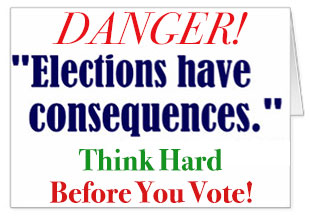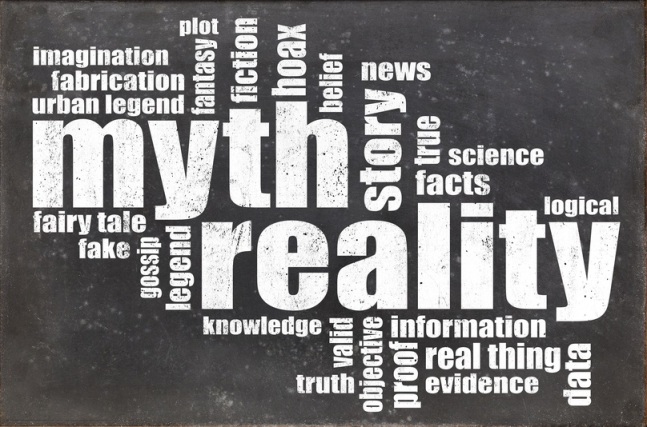
The Federal Election has at last been called and now begins 5 weeks of intensive coverage of the event by the media – some people have election fatigue already, including me – because we seem to have been in ‘election mode’ ever since Malcolm Turnbull was deposed midway through last year.
Certainly, many people have wanted an election and we’ve been subjected to the current PM’s style, where his announcements regardless of the subject have always included an attack on the Opposition leader, Bill Shorten MP.
Slogans or Substance?
It is no secret, Prime Minister Scott Morrison was in advertising before he entered parliament. He helped produce the three-word slogan ‘Stop the Boats’ and other soundbites that helped the Coalition win 2013 and 2016.
Therefore, as the respected journalist, author, and TV presenter, Geraldine Doogue observed the other night on the ABC’s The Drum, Australian voters, must take responsibility to seek out, scrutinise and digest the news and facts and make the most informed choice we can.
Will people do this?
There is compulsory voting in Australia but also fake news, misinformation, and selective reporting, if not downright peddling of misinformation.
It is imperative voters actively engage with the process.
 The Social Media Factor
The Social Media Factor
This is the social media age, the 24hour news cycle, headlines written for clicks regardless of facts, and a time where clever use of digital tools make the production of fake news and post-truth an hourly, never mind daily occurrence.
We have all been subjected to:
- online scams,
- robocalls,
- mass text messaging and
- blatant lying.
Scepticism and cynicism abound…
We’ll need more than luck to wade through the media blitz of the next few weeks.
I’m A Friend Of The ABC

I prefer the ABC and SBS, The Guardian, The Conversation and reading journalists with a track record I trust.
I completely avoid the Murdoch press, most of News Limited and despise ‘shock jocks’ because they make a mockery of reporting and journalism.
A discussion with a friend revealed shared nostalgia for some of the voices of the past like Andrew Olle and the days when a well-funded ABC investigated topics thoroughly and produced groundbreaking and effective exposes regularly and not just occasionally.
I imagine it was these voices on radio and television and in the newspapers that influenced me to write and at one stage want to be a journalist as the following illustrates.
Trying to ‘do a Kondo’ and clear clutter, I discovered a folder with some writing from days at Croydon High School in the 1960s.
In Form Three or Four, I was fortunate to have Mrs Walker for English. She was young, a recent immigrant from England where she had worked as a journalist, and she encouraged my love of writing.
I have a strong image of her chewing gum in class and apologising, ‘I’m trying to give up smoking, so please forgive me.”
My Fourteen-Year-Old Self
What is, as far as YOU are concerned, the ideal job?
I would like an interesting job where I could meet people, see places and do something different. I would like to spend my life as a journalist because I feel this fits the specifications.
With a wide scope of various fields, I think this job would be interesting. I would be able to meet people and also be able to travel. I enjoy writing and I feel this job could never be boring.
The job is reasonably well-paid and I would like to eventually become a freelance journalist, be my own boss and write for my own pleasure as well as other people’s.
To choose where to work and live, to travel and write about my experiences would be my ideal job.
First Day of First Job
My first job was as an assistant in a Jeweller’s shop on Saturday morning. I stepped over the threshold of the doorway with a feeling of apprehension about the four hours ahead of me.
It was a cold morning and I blamed the chill in the air as the cause of my shaking but to look back honestly, I was just plain scared. The owners of the shop were friends of the family and I was worried, not only in case I did not live up to their expectations but also in case I would do anything wrong.
My first task was to dust the shelves, as well as to keep an eye on the other assistants and pick up a few hints on how to serve. The shelves were clustered with valuable glasses and ornaments and I could barely trust my shaking hands to lift up the fragile ornaments.
Talking to customers came easily but trying to sell items and handling large amounts of money made me nervous too.
Later On
I came cheerily to work, set about my tasks in preparations for the flow of customers. Daringly, clattered around as I dusted, talked merrily to customers offering suggestions for gifts as I now had experience. Nervousness disappeared. Became self-assured.
Explanation & Reflection
I remember, Mrs Walker, putting to rest my romanticism about choosing journalism as a career,
‘You’ll, have to do what the editor wants – and that may be covering the local Cat Show – even if you’re allergic to cats!’
The first job I wrote about was with Finchley Jewellers’ – a shop owned by the parents of ex-Human Rights Commissioner, Gillian Triggs who was studying at Melbourne University in the 60s.
Our age difference and study schedule meant I didn’t see much of Gillian or her sister Carol and our paths haven’t crossed since childhood.
However, my interest in writing and reading quality journalism has never faltered and I was disappointed that this year, ill-health made me miss the A.N. Smith lecture in journalism, held annually at Melbourne University.
Arthur Norman Smith was a founder of the Australian Journalists’ Association, served as its first general president and for five years as its general secretary. Thanks to a generous bequest from the Smith family, the prestigious A.N. Smith Lecture in Journalism is presented each year by a leading authority on some aspect of journalism.
There are always memorable speakers and I wrote a blog post after the 2018 lecture by Walter Robinson, Editor-at-Large of the Boston Globe and leader of the Spotlight Team’s investigations into abuse in the Catholic Church last year.
Today, I decided to post highlights from Sarah Ferguson’s 2015 lecture because I think they are most relevant as we go into this election campaign. You can watch it yourself on youtube.
Sarah is a Walkley Award-winning journalist and her documentary series on the Rudd/Gillard years The Killing Season broadcast in 2015.
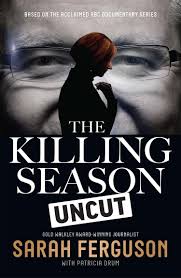
- The Killing Season on TV had 1 ½ million viewers and another ½ million watched it on iView.
- It was the highest rating show in its time slot since 2005 and beat commercial stations.
- It also was watched by the 18-24 demographic like other ABC shows.
Why?
Sarah answered that question by saying it was high drama with themes of retribution delivered with feistiness. It discussed an unresolved dispute between Gillard and Rudd that confused many Australians. Why did Gillard depose Rudd in 2010?
They were both good TV performers and the ABC technical staff highly professional.
I wonder if there will be funding available to do a similar expose of the leadership debacles in the Liberal Party?
Not according to this Staff Notice last year and considering the budget cuts inflicted on the organisation this year!

But what the public broadcaster and other news outlets deliver is not just about the ABC being starved of funds or even who owns the media and Sarah’s 2015 lecture was prescient.
Can we really handle the truth?
When The Killing Season aired on ABC TV, then Prime Minister Tony Abbott lifted his arms to the press gallery and declared “Thank you to the ABC”.
- It was the ABC’s 4th landmark TV series on political leadership but will there be another?
- Will our current and future leaders feel the same obligation of history?
- Or will future leaders no longer trust their legacy to a media they don’t control?
While governments and major institutions found new ways to limit transparency – the media industry traded away its freedom to investigate for short term access.
Sarah asserted that there is a war on transparency underway and the media is colluding with the wrong side.
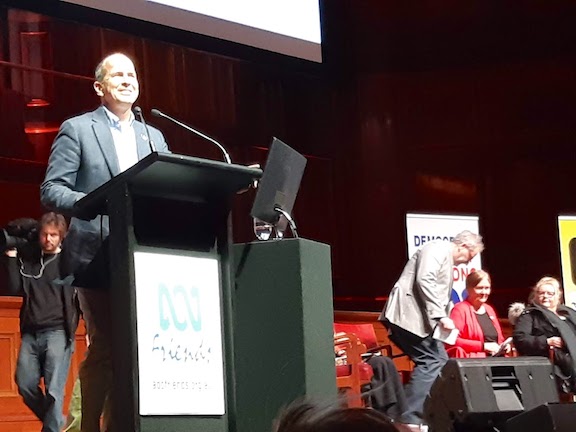
Freedom from Information- Australia’s War on Transparency
Sarah had recently returned from England where she had been living and working as a reporter, and researching and writing a book.
To lighten the mood before launching into her speech, Sarah commented on the dual citizenship saga embroiling Australian politics and said if she was deported she’d prefer to go to Essex, England her mother’s birthplace rather than her own, which was Lagos Nigeria.
She then talked about UK politics and the rise of Jeremy Corbyn. The UK political scene was going through convulsions and it was having an interesting effect on the media in Britain and Australia.
Sarah attended the British Labour Party Conference – the first for Corbyn as party leader. He is from the ‘hard left’ – a throwback chosen because he was not a retail politician and as far removed from Tony Blair while still being in the same party.
The press described him as a ‘defrosted member of the Politburo.’ This view of Corbyn still colours the view many sections of the media portray of Corbyn.
The British public threw the spin of Blairism and the clones it produced out, and Corbyn promised straight talking, yet at the conference, Sarah observed, they still went for slogans. Albeit they were four words and not three, like Australia’s politicians.
Sarah elicited a laugh from the audience when she said one Tony Abbott slogan that never made it up on a billboard was his ‘Nope Nope Nope.’
(Except social media enjoyed memes of ‘dope, dope, dope’!)
Sarah considers politics better viewed through satire and how true is that of Australian politics!
After the British Labour Party conference, a satirist quickly commented. What is the only red thing Jeremy Corbyn doesn’t like?
The answer was the autocue.
Corbyn had delivered a wooden speech, obviously reading the autocue and when it said “Strong message Here” in bold and underlined – he actually read those words aloud with emphasis!
Below is the teleprompt in the ABC newsroom studio, Melbourne.
We have comedians like Shaun Micallef, Charlie Pickering, Tom Gleeson and Sammy Jay scrutinising policies and their effects on ordinary Australians better than many journalists.
They cut through the interminable spin and bullshit politicians serve up at the behest of their media advisors.
Sarah started with that story about Labour in the UK to lead into the question, what does this mean for Labor in Australia and Bill Shorten because the warp and weft of the political wings of the British and Australian labour movement share common threads.
New Labour of Blair is dead and buried yet this was inspirational to Kevin Rudd and his rise to power. In 2016, Shorten contested his first election as party leader and although coming close, he didn’t win.
Ferguson’s Observations in 2015 Still Relevant Today
Corbyn and his supporters are extremely distrustful of the mainstream media who disparage him at every turn. MSM makes fun of his clothes, his mode of transport – referring to his ‘Chairman Mao-style bicycle.’
But Corbyn is as equally distrustful of the BBC.
However, what Sarah observed was that Corbyn’s antagonism to the BBC was nothing compared to the then Tory PM David Cameron’s determination to go after the BBC’s blood, even although he is considered a small ‘l’ liberal.
This antagonism and disrespect of a public broadcaster’s role is the lesson Sarah wanted us to take from her story about British politics in view of the topic. “Freedom from Information- Australia’s War on Transparency”.
She reiterated the irony of Tony Abbott praising the ABC after The Killing Season was aired yet he’d assaulted the ABC’s independence and integrity over Q & A.
When it suited his politics he commended the ABC because The Killing Season exposed the machinations in the ALP for the leadership.
Would he say the same today after some of the documentaries and investigations have exposed his party’s shenanigans and failures?
Regardless of political viewpoint, the ABC should tell the stories important for Australians.
Sarah wants to tell compelling stories about and for Australians. She wants her political reporting to be incisive and would like to be a voice for the marginalised and those often forgotten.
Journalists should be able to ask questions of government and politicians just as there is an assumption you are allowed to ask questions of corporations.
But this ability/belief is under threat.
Will future readers accept the ABC has the right to tell their story without controls?
We have seen changes to media ownership laws and laws regarding security.
And recently laws covering social media content have been rushed through parliament and supported by both major parties.
These changes have caused disquiet in parts of the community and there is a concern it could prevent any anti-government content being aired regardless of what politicians are in power.
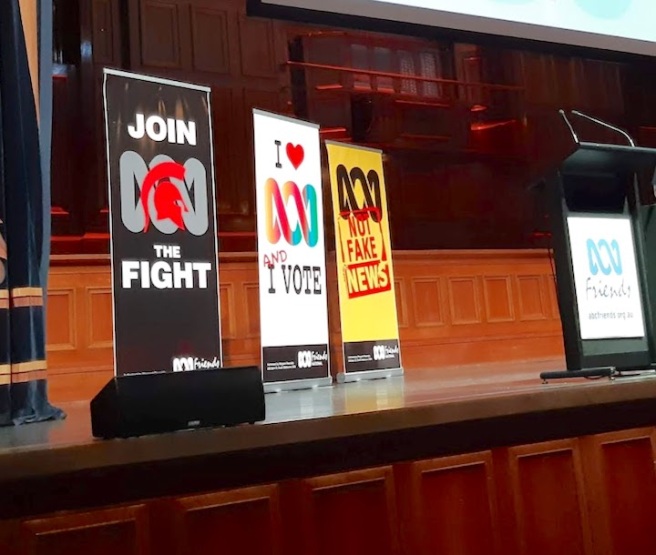
More and more politicians and businesses are managing the media.
When Abbott was in Iraq he had his own media unit that fed stories to mainstream media.
Mike Rand, Australia’s most popular Premier lured an advertising executive to control his media statements.
Rand posted his own media and press releases on social media. This information picked up and repeated as if he’d been interviewed!
Lazy journalists continue to cut and paste and copy information without checking its veracity.
Already we have the respective party leaders addressing the public in videos. They carefully select the background and message and without any pesky journalists asking awkward questions can lecture/smooth talk/spruik whatever they want.
Will people check the truth of what they say or remain rusted on or anti the person depending on their politics. Will they be judged on content or looks?
Digitisation
In 2015, there was a discussion about the new digital tools for future reporting. Some of these tools came from the Gaming world – they are virtual reality tools.
Sarah asked, do you want a reporter going into a war zone and/or refugee camp behaving as if it is all amazing or should it be with an attitude of curiosity and asking hard, relevant questions?
Interestingly, when Mark Zuckerberg of FaceBook fame decided to feed news direct, he chose respected organisations like the BBC, The Guardian, New York Times etc.
There must be original compelling stories told in a way audiences can trust. This involves meticulous preparing and patient listening.
Interviewers must ask intelligent questions, imagine and frame questions that help us understand the humanity of subjects.
Key To A Good Interview
- Preparation
- Unflinching rigour
- Credibility
The latter two qualities must always be retained.
Sarah left the audience with two of her heroes:
Vasily Grossman
A fearless Russian writer and journalist who gave us a great example of honest eyewitness reporting. He made detailed notes as he was travelling with the Red Army in WW2, writing about the Nazi extermination camp Treblinka and even of the rape of German women by the victorious Russian army.
His book about Stalin’s antisemitism and his disillusion with the regime was censored, ‘The KGB raided Grossman’s flat after he had completed Life and Fate, seizing manuscripts, notes and even the ribbon from the typewriter on which the text had been written.’ It had to be smuggled out of the Soviet Union after Grossman’s death.
Nellie Bly
A writer who admitted herself to a mental institution so she could write with authenticity. An American journalist she was widely known for her record-breaking trip around the world in 72 days, in emulation of Jules Verne’s fictional character Phileas Fogg.
A pioneer in her field, she is credited with launching a new kind of investigative journalism. She was also a novelist, industrialist, inventor, and charity worker.
I’ll add one of my heroes:
Andrew Olle (1947-1995)
Andrew Olle was one of Australia’s most admired broadcasters. He was respected by colleagues, opponents and the public for his fairness, quiet scepticism, calmness, gentle humour and lack of hubris. Starting out as a radio news cadet in Brisbane, Olle presented most of the ABC’s flagship current affairs programs including Four Corners, The 7.30 Report, Nationwide and A Big Country.
He also hosted election night coverage and the 2BL morning radio program in Sydney. His sudden death from a brain tumour at 47 caused an outpouring of public grief, including thousands of phone calls to the ABC, thousands more signing a condolence book and 6000 cards sent to the Olle family.
As a consummate radio and television presenter and interviewer he wanted light – a light shone on what the interviewee knew better than he. His ego was big enough to not care whether he “won” or not, he wanted his listeners and viewers to know more about the person and the subject they had just experienced. It was a unique softly, softly approach that won him so many hearts.
…Annette, his wife, recalls Olle saying he was “cursed with seeing both sides of any argument”. Again, of course, it was about getting balance and fairness exactly right as well. He was the last person to rush to judgement.
Peter Manning
Here is a link to the annual Andrew Olle Media Lecture given by John Doyle in 2005. It is well worth reading because again, it is an intelligent person sharing his observations and perceptions and being prescient about not only an industry but a world important to us all.
